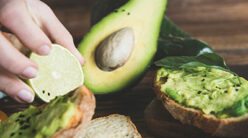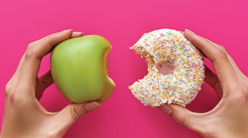You stressed? Come on. Just because you’re swamped at work, your car broke down on the freeway yesterday, and you’ve barely had time to breathe-much less make it to the gym-that doesn’t mean you’re stressed, does it? Sure, you admit you’re a little frazzled, maybe even cranky. But the last straw came this morning when you discovered you couldn’t zip up your favorite jeans.
Guess what? It may be the frantic pace of your lifestyle that’s making those jeans so tight. Research shows that stress can not only raise your blood pressure and increase your risk of having a heart attack, stroke, or other disease-it can add to your waistline, too. You can wind up storing more fat around your middle because of chronic stress at work or home, and feeling tense or anxious can also lead to overeating in an attempt to distract yourself or feel better.
Read on for the surprising reasons stress may be your diet’s worst enemy-and to find out how to keep your job, family, and never-ending to-do list from putting on the pounds.
The Cortisol Connection
Believe it or not, all fat is not created equal. According to Elissa Epel, a health psychology researcher in the Health Psychology Department at the Univer-sity of California at San Francisco, there are two basic types: visceral fat, which is stored in the abdomen and which pads your internal organs, and peripheral fat, which is stored just below the skin. While peripheral fat may not look attractive (it’s responsible for those bulges on your hips and thighs), it’s less of a health risk than visceral fat. It’s not clear why, but studies show that people with more visceral fat also have an increased risk of developing heart disease, diabetes, high cholesterol, and other diseases. Your genetics and body type will affect what type of fat you have and how much, but other factors influence it as well.
Epel has been studying the connection between stress and fat placement for several years. She’s found that women tend to store more fat around their middles when they’re under stress. The reason appears to be that when your body is stressed, you produce higher levels of stress hormones, such as cortisol and adrenaline.
“Anatomically, this visceral fat is very sensitive to hormones,” Epel says. “It has more receptors for hormones such as cortisol. If you have a lot of cortisol circulating in your body, that activates the fat-storing pathways and encourages your body to store more of this type of fat.” The result is that if you’re constantly under stress and your body is producing higher-than-normal levels of stress hormones, you may become thicker around the middle because visceral fat is being deposited inside your abdomen.
Realize that if you’re overweight, you’re probably going to store extra fat all over, including around your belly. If you’re fairly lean, though, and have a lot of abdominal fat, you may want to pay more attention to its cause. You may be genetically predisposed to store fat in that area (if your mom has a tummy, you probably will too), but stress could be a contributing factor too.
How can you keep cortisol from affecting your waistline? Combat stress by exercising regularly, making time for yourself, and taking minibreaks during the day. “This is one more reason to pay attention to stress in our lives and in terms of weight regulation,” Epel says. “It’s not just a simple formula of calories in and calories expended. The hormonal environment can influence where the body places the fat.”
Why Stress Makes You Hungry
Picture this: You’re driving to work, and suddenly another car veers in front of you. You slam on the brakes and squeal to a stop, missing the car’s bumper by inches. You gasp in fear and your heart pounds; a few minutes later you feel shaky, weak, or nauseous. That’s your body reacting to the perceived threat in what’s called the fight-or-flight response, and it’s likely to make you hungrier as a result, says Dr. Nick Hall, a psychoneuroimmunologist and director of the Wellness Center at Saddlebrook Resort in Tampa, Florida.
The fight-or-flight response refers to how the body becomes mobilized in the wake of stress. As our cardiac, respiratory, and central nervous systems all become “revved up” and ready for action, they require more fuel. “In that regard the body is a machine,” Hall says. “It needs fuel, which for humans is food. And the best food to eat during an emergency response is that which is most rapidly converted into blood sugar-carbohydrates.”
Unfortunately, today’s stressors don’t usually require additional fuel to combat them-so those calories get stored as fat. The problem with chronic stress is that it can provoke this kind of response continuously-and you wind up with a constant urge to eat. “Therein lies the problem.” Hall says. “We still have that ravenous desire to take in food, which would have been no problem when we were spending hours each day engaged in physical activity. But now it’s a major problem.”
Yet stress can suppress our appetite as well, and that’s because of a chemical called corticotrophin releasing factor (CRT), which is one of the first chemicals produced when you encounter stress. CRT initially shuts down your appetite and is associated with feeling anxious. It’s when the other brain chemicals are produced that most people experience the urge to eat.
If you suddenly feel the need to eat but you know that it’s a result of stress and not physical hunger, Hall suggests doing some push-ups or running up a flight of stairs. This will produce small amounts of CRT that will help take the edge off your appetite. Eating something low in calories-fruit or vegetables, for example-can also let you respond to this urge without blowing your diet. Instead of beating yourself up for eating, spend a little extra time at the gym. “Recognize that in times of stress you’re responding to natural biological cues that are going to have a tendency to make you eat a little more,” Hall says.
Your Brain Is Hungry
Do you turn to pasta or pizza when you’re feeling anxious or down? Maybe you’re short on serotonin, a brain chemical that has been linked with depression. A lack of serotonin can also trigger a craving for carbohydrates. “When you eat carbohydrates, it actually can result in a restoration of serotonin back to normal,” Hall says. “It’s essentially a way of self-medicating.”
However, this approach is far from foolproof. If your body can’t convert the carbs into serotonin, you can eat as much pasta as you want, and you’ll change only the contour of your body, not the contour of your mind, Hall says. But if you can’t seem to get enough carbs, it may be worth checking with your physician.
“It’s important for people to realize that their desire for certain types of foods is not always triggered by pleasure seeking,” Hall says. “Sometimes there is something in the brain telling you that you need to fix a chemical imbalance.” To maintain optimum nutrition, Hall suggests following the American Dietetic Association guidelines. At least 50 percent of the calories in your diet should come from carbohydrates, with the rest evenly distributed between fat and protein.
But I Deserve It!
Part of the reason stress affects your eating habits may be the need to comfort yourself, says Joy Bauer, registered dietitian and author of The 90/10 Weight-Loss Plan. “When you’re stressed, inhibitions are down. People don’t have the same staying power to make smart food choices,” Bauer says. “They also tend to use food to numb themselves and as a way to feel good. People tend to associate stress with being nice to themselves, and then they interpret that to mean taking lots of liberties with food that they normally wouldn’t.”
That may mean eating starchy, sweet foods, such as cakes, or fatty, salty foods, such as potato chips. People also turn to comfort foods, such as ice cream, cookies, and pizza, when they’re under pressure. “Comfort foods tend to be foods that remind us of childhood, when weight and calories and health weren’t such an issue,” Bauer says. “They’re carefree foods and foods that we don’t usually allow ourselves without guilt.” The problem is that they’re often high in calories and fat, and we eat more of them than we should.
Women often use food as a distraction or to cope with feelings of loneliness, depression, or anxiety. “They talk about feeling empty and using food to sort of stuff their emptiness,” Bauer says. “For example, people who are home alone on Saturday night and who are depressed, bored, or lonely will eat a pint of ice cream. They use food to numb emotions that they don’t want to deal with or they don’t know how to deal with.”
The Stress Solution
Understanding the benefits of overcoming stress-induced eating is the first step to taking action. “I think that people need to view stress as almost the most critical and important time to feel in control,” Bauer says. “Going overboard with food makes us feel more out of control.”
So how can you feel more in control? By taking care of yourself and doing such things as eating healthfully, making time to exercise, and keeping your energy levels up instead of trying to escape your problems through food. “Nobody feels empowered when they’re on the third row of Oreos during a stressful predicament,” Bauer says. “When you eat well and exercise, it frees your head up to deal with stress better. You’re clearer and less foggy from continuously stuffing yourself with junk food and fatty foods.”
Remember also that severely restricting your calories only adds to the stress you’re under. If you’ve just moved to a new home or have a “full plate” at work, it may not be the best time to resolve to lose that last 10 pounds. “It goes both directions-you can’t undereat and you can’t overeat,” Bauer says. “You have to invest in some sort of balance so that you’re eating enough and not too much.”
If you’re feeling anxious, overwhelmed, or tense, look for options other than eating. E-mail or call a friend. Write in your journal. Spend a few minutes reading a favorite passage from the Bible or praying. Take a shower or head out for a brief walk. Or put on some favorite music and focus on that.
If you’ve noticed that you’re gaining weight, take a look at your lifestyle to see if it could be the culprit. Maybe you just need to watch your diet or work out more. Or maybe it’s time to slow down. Remember that while stress can in fact make you fat, it doesn’t have to do so. Develop effective ways of coping with stress, and you’ll not only feel better but stay fitter.







1 thought on “Is Stress Making You FAT?”
lilly
(June 21, 2010 - 7:58 am)Yes, most of the time. When stressed, we tend to overeat because we eat without thinking. We’re trying to keep ourselves awake, that’s why we eat. We should get enough rest and sleep to avoid stress.
Comments are closed.